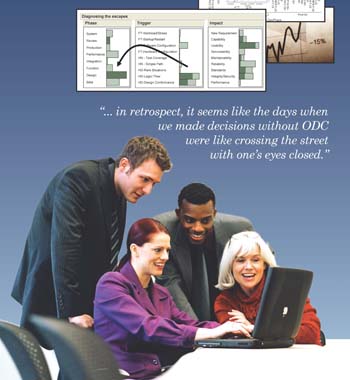ODC creates software engineering insights through leveraging information trapped in the defect stream. Design changes, QA issues, trouble tickets .. are fed into the ODC system which turns them into insightful measurements on the product and process. This has worked on a small teams of 10 and a telecom network project with 1000 engineers.
.. brings AI to Root Cause Analysis and makes it 100x better.

Value:
ODC provides diagnostics on the product and the process.
ODC helps us make better Engineering, Management and Financial decisions.
The analytics with ODC apply to most software engineering practices. Take for instance the task of improving testing, or requirements. We all know that requirements are important and vouch we'll do a better job next time. But how do we do that if we do not precisely know what the characteristics of our requirement oversights are? To want to do a better job does not necessarily mean we will do better, without a coach giving us an outside-in view. ODC data and analysis gives us that objective, dispassionate insight on the process. The value ODC brings can be captured as - Gaining Insight, Evaluating Methods, Increasing Speed, Controlling Costs and Empowering the Workforce.
How:
Bringing ODC into an organization and making it successful takes skill and experience. There is more than one way to insert process and technology into organization. But, its vital that the methods match the organization's culture, readiness and business need.
A critical situation that needs ODC as a diagnostic approach with results available in days and weeks is a very different application compared to one where the objective is to enable ODC across a large number of departments so they acquire a common language, methodology and tools. An application where our objective is to affect specific projects only can take a different approach, or one where there is a need but coupled with significant resistance due to past experience with a failed process.
We bring experience across a broad base of projects, cultures, and enthusiasm levels. Talk to us to help tailor the best methods to suit your needs.
Who:
ODC has been used by several organizations both small and large. The best documented studies have been published and reported in technical literature or public talks. A few notable ones are IBM, Motorola, Cisco, Lucent, Telcordia, Caterpillar, Cognizant, Satyam. Our engagements span across a broad swath of industrial and consumer applications - such as embedded software, enterprise software, insurance, operating systems, hand-held devices, machinery, insurance, and business applications.
Training:
Much of ODC information is buried in deep technical, peer-reviewed articles. Consequently implementations tended to occur in companies with a deep technical bench: IBM, Siemens, Cisco, Motorola, CAT, ABB... A very different software engineering scenario than the consultant driven programs like Agile.
All that changes today. Our training services make ODC available to a more diverse set of IT and software engineering companies. - Ram. September, 2022
To apply ODC in the every day world of software engineering, the research articles may not best help you achieve your goal. We need to apply these ideas in production - where the time for research and discussion may not exist. And a task may be divided amount different skill groups. And the producers of data at one level are often not the consumers of that data at a different level. The ODC lifecycle spans different skill sets in different parts of the organization and interfaces with business and technical aspects of the business. We need to train the different teams and provide a support structure that goes across. We also need project engagement to make them successful. We have training programs for all elements of this process, and our staff will work with you to best determine the next step.
History:
ODC technology was invented by Ram Chillarege. He was awarded IBM's Outstanding Technical Achievement Award and the IEEE Technical Achievement Award for the invention of ODC.
Reading Guide
ODC is a deep topic and there is a considerable amount of very technical information published over the past 25 years. We are gradually collecting a set of articles that should be easier to navigate on this site. This is work in progress.. so your patience is appreciated. Start with the list below.
ODC TOPICS -- Link to a set of pages on ODC
-
ODC - a 10x for Root Cause Analysis A short 3 page article that communicates on of the very valuable applications of ODC.
-
Orthogonal Defect Classification - A Concept for In-Process Measurements This is the original ODC paper - still a good read for the basic concepts. Look at the more recent articles to get a more current and easier to read overview.
-
5 Differences between Classical and ODC Root Cause Analysis in Software A video clip that summarizes the current thinking an application of ODC.
-
Test and Development Process Retrospective - a Case Study using ODC Triggers A case study that illustrates the use of one of the ODC applications to gain insight into the current development process.